'We dig graves for free, like our fathers did before us'
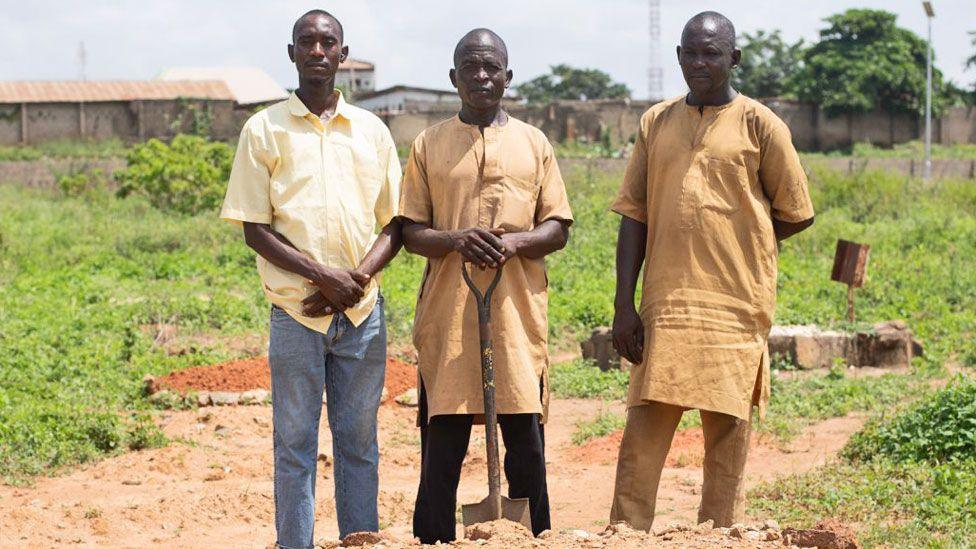
- Published
For more than 50 years, one family has dedicated itself to caring for the biggest graveyard in Nigeria's northern city of Kaduna - much to the gratitude of other residents who do not fancy the job of dealing with the dead.
Until a few weeks ago, they did it for no formal pay - digging graves, washing corpses and tending to the vast cemetery, receiving only small donations from mourners for their labour.
The vast Tudun Wada Cemetery was set aside for the Muslim residents of the city by the authorities a century ago.
The Abdullahi family became involved in the 1970s when two brothers - Ibrahim and Adamu - began working there.
The two siblings now lie beneath the soil in the graveyard, and their sons have become the cemetery's main custodians.
"Their teachings to us, their children, was that God loves the service and would reward us for it even if we don't get any worldly gains," Ibrahim Abdullahi's oldest son Magaji told the BBC when asked why they had chosen to continue as unpaid undertakers.
The 58-year-old is now in charge at Tudun Wada - shepherding operations and the 18 members of staff or until recently - volunteers.
He and his two younger cousins - Abdullahi, 50, and Aliyu, 40, (Adamu Abdullahi's sons) - are the three full-time workers, all reporting in by 07:00 for a 12-hour shift, seven days a week.
They always need to be on call because, according to Muslim rites, a burial should be organised within a few hours of someone's death.
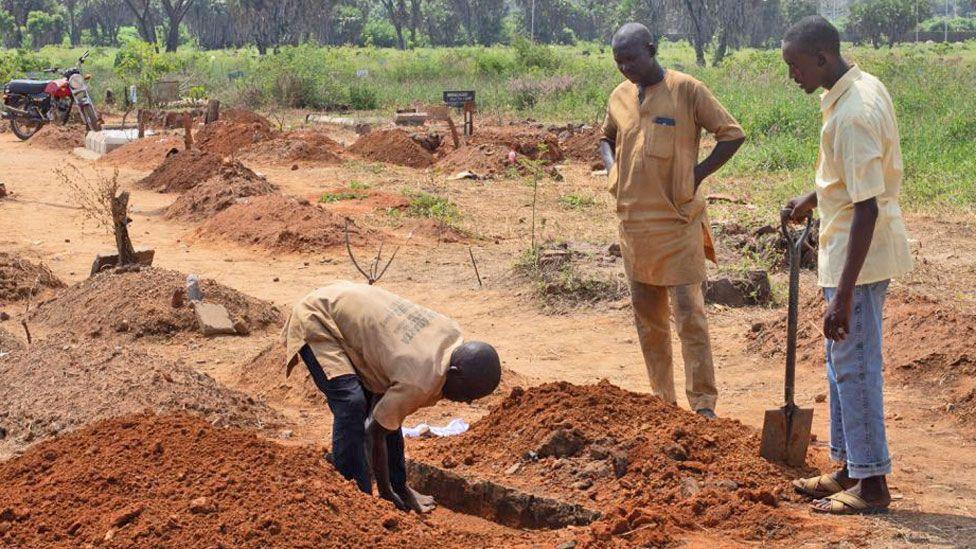
It can take at least an hour to dig a grave - and is done to exact measurements sent by those preparing the body
Magaji tends to get the call on his mobile, either directly from a relative or an imam - all religious clerics in the city have his number.
"A lot of people have our numbers and as soon as someone dies, we get a call and immediately we get to work," he says.
One of the trio goes to tend to the corpse, which may include washing it and wrapping it in a shroud.
The body is measured and those details are texted back to the others so that a grave can be dug.
This can take around an hour - with two people taking it in turns to dig down 6ft (1.8m) into the earth - sometimes longer when it is in a stony area of the graveyard.
They can dig around a dozen graves in a day - hard work in the Kaduna heat.
"Today alone we have dug eight graves and it's not even noon, some days are like that," says Abdullahi, who began work at the cemetery when he was aged 20.
The cousins have experienced very stressful times - especially during religious violence when tensions flare between the city's Christian and Muslim residents. The two communities tend to live on opposite sides of the Kaduna River.
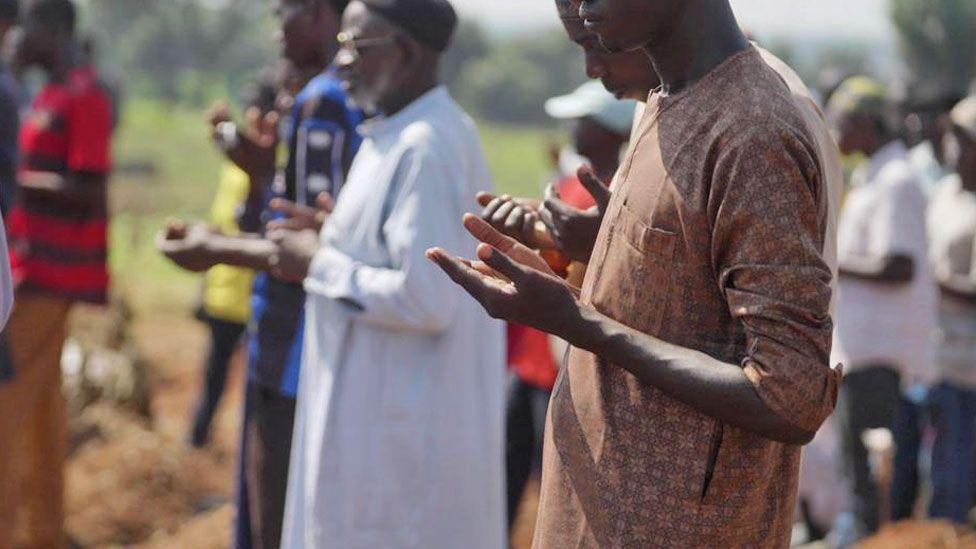
Funerals usually take place on the same day a person dies - and most days there are around a dozen held at Tudun Wada
"We have had a couple of religious clashes in Kaduna but the one that sticks the most for me was one in the early 1990s. A lot of people were killed," says Magaji.
"We went round gathering the corpses and taking them off the streets."
Muslims were taken to Tudun Wada in the north of the city and Christians to graveyards in the southern suburbs.
"It was such a troubling time personally and I wasn't long in the job then but that helped enhance my resolve to continue," he says.
Usually, while the team digs a grave, at the local mosque the imam announces during one of the five daily prayers that a funeral will be taking place.
Many of the worshippers then go to where the body has been prepared for prayers - it is then transported to the graveyard for burial, often thronged by the mourners.
Once by the graveside, the shrouded body is lowered - it is covered with a layer of sticks and broken clay pots as a mark of respect. The grave is then filled to form a slightly raised bed.
After the rituals are complete and before the mourners leave, the graveyard keepers appeal for donations.
They were amazing people who loved what they did and have imbibed their children with this altruistic behaviour"

This is usually done by 72-year-old Inuwa Mohammed, the oldest worker at the cemetery, who explains the importance of Abdullahi family to the community.
He used to work with the cousins' fathers: "They were amazing people who loved what they did and have imbibed their children with this altruistic behaviour."
The little money collected will sometimes buy lunch for the crew - but is never enough for anything else. In order to survive, the family also has a small farm where they grow food.
The graves are recycled after 40 years, meaning land is not a big issue - but maintenance is.
"There is a lot that is lacking at the moment - we don't have enough equipment to work with, or good security," says Aliyu, the youngest of the cousins and who has worked there for 10 years.
He explains how part of the wall has collapsed, allowing those on the look-out for scrap metal to steal the grave markers.
Some of the graves have metal plates inscribed with a name and date of birth and death – though many do not as Islamic clerics do not encourage ostentation. Most are just outlined by stones and bricks or with a stick.
Either way, the cousins remember the location of everyone buried at the cemetery and can direct people if they have forgotten the location of a relative's grave.
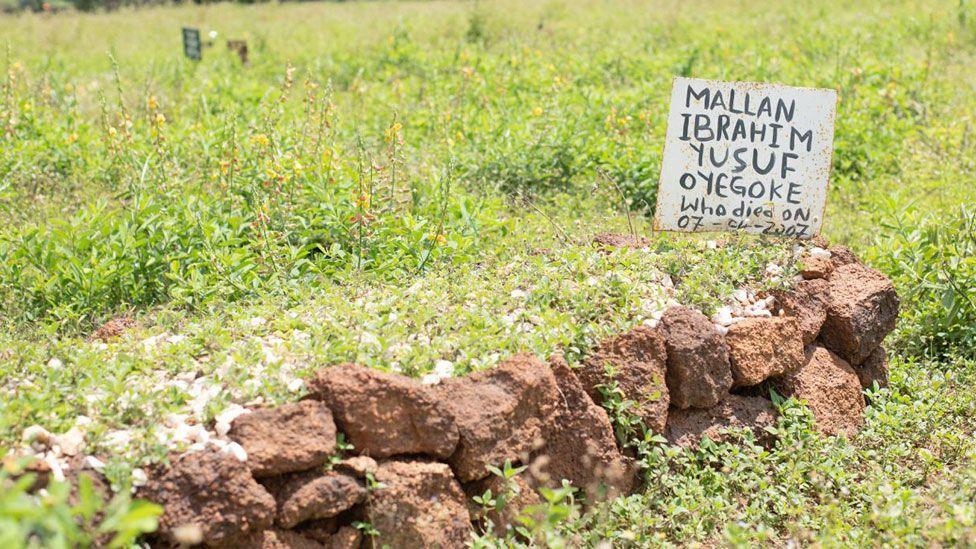
Graves are sometimes marked and are kept for 40 years
Following the BBC's recent visit to the graveyard, they have seen a dramatic change in fortune.
The new local council chairman, whose office oversees the site, has decided to put them on the payroll.
"They deserve it, given the massive work they do every day," Rayyan Hussain tells the BBC.
"Graves are the final homes for us all and people who do this kind of hard work deserve to be paid, so my office would pay them as long as I am chairman."
Magaji confirms that the staff have started receiving a monthly salary for the first time:
the five oldest, including himself, are getting 43,000 naira ($28; £22.50)
the others, including Abdullahi and Aliyu, are receiving 20,000 naira ($13; £10.50).
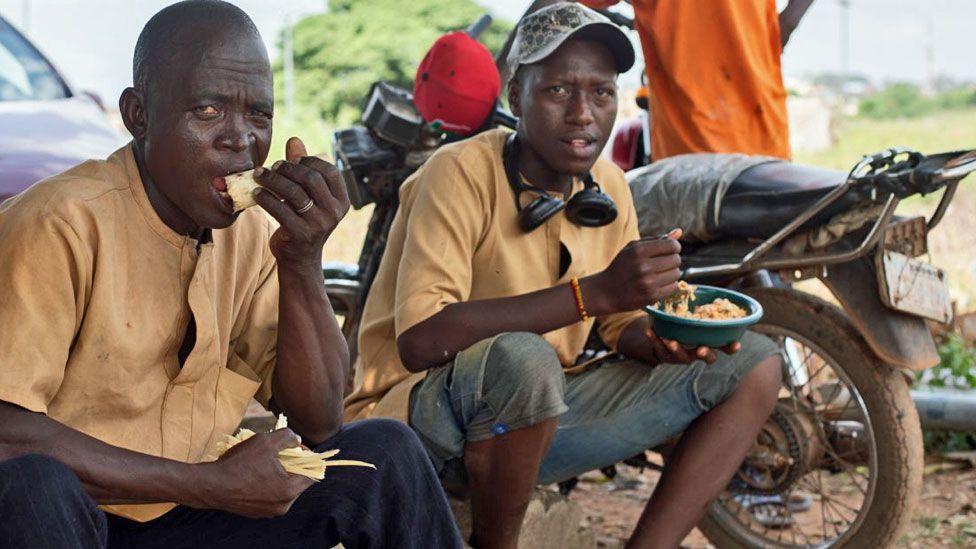
The small salary now being allocated to the Tudun Wada workers is well below the national minimum wage
This is well below the national minimum wage of $45 a month, but Mr Hussain says he hopes to increase their allowance "with time".
He says it is regrettable that the graveyard was abandoned for years by previous local council heads.
He has plans to repair parts of the fencing, install solar lights and add security, the chairman adds.
"I am also building a room in the graveyard where corpses could be washed and prepared for burials, before now all of this had to be done from homes."
For the Abdullahi family, it is all welcome investment - and Magaji hopes it will ensure that one of his 23 children will one day become a custodian of the cemetery.
You may also be interested in:

Go to BBCAfrica.com, external for more news from the African continent.
Follow us on Twitter @BBCAfrica, external, on Facebook at BBC Africa, external or on Instagram at bbcafrica, external